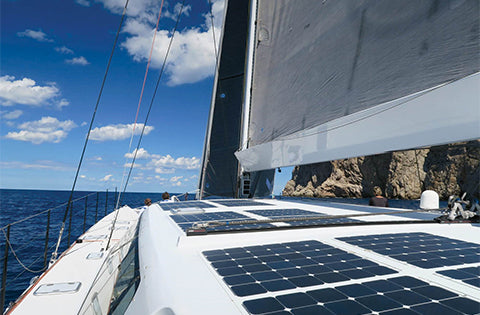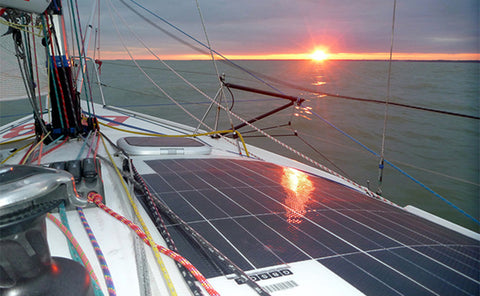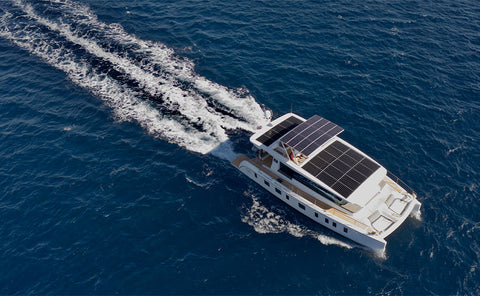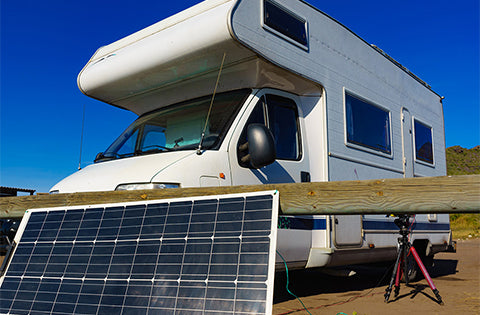Like other vehicles, boats use electrical systems to operate. Some have simple low-voltage needs like a car, while others need more complex, fully-featured power systems. How do these boats get this electricity? In this article, we discuss marine electrical systems, including how they work, the different parts, and a few safety tips you need to know about. Let’s get started!
What does a marine electrical system power?
A marine electrical system powers everything on your boat. What it powers and how big and complex a system depends on the size and type of your boat. Some systems will have a starting battery and perhaps a small house battery to power an electric trolling motor, radio, and GPS. Other systems can power all the livable amenities of a massive super-yacht. Ultimately, what you can power with your electrical system will depend on how many watts your system generates. Also, factor in the capacity of your batteries, the size of your inverter, and how much space you have to house the system.
How does a marine electrical system work?
When you connect to shore power (i.e., AC electricity from a pedestal at a dock or a marine battery charger), the power charges your batteries and runs your appliances. To charge your batteries, you need to convert the AC power to DC power through a converter or battery charger. You can run your appliances and devices as you normally would when plugged into shore power.
When you’re not connected to shore power, your boat will need to generate its own power. This is where your solar power and/or generator come into play. The watts from your solar panel, generator, or boat engine will run through the wires to the converter and charge your batteries. Then, when you need to run an appliance, the electrons will move from your battery bank through the inverter to your outlets. This is how marine electrical systems work both on and offshore.
Do boats use AC or DC power?
Not all boats have the same electrical system. Some smaller boats only run off DC power. This means they likely have one or two house batteries to power 12V systems. There is really no need for an AC electrical system in this case.
In comparison, larger boats such as yachts or catamarans will usually have a house electrical system in addition to the DC power system. To power these crafts fully, you’ll need AC power. You can achieve this by plugging into shore power directly or using a large enough inverter with your house battery system. You can also use your generator to create AC power, but this option isn’t typically feasible for long-term use.
Choosing a marine battery
For your starting battery, we recommend going with the manufacturer’s suggestion. They’ll know which type of battery will work best with your boat’s engine. For your house batteries, however, we recommend choosing lithium marine batteries like our high-quality Battle Born deep cycle lithium batteries. This is because they’re at the forefront of battery technology and have countless benefits compared to lead-acid batteries. For one, lithium batteries are the most energy-dense batteries on the market right now. Thus, you can store much more energy without taking up as much space or weighing down your boat.
Moreover, lithium batteries last longer than their lead-acid counterparts simply because their charge and discharge cycles are so much more efficient. They also charge quicker, have no maintenance requirements, and are much safer. Without a doubt, lithium is the way to go.
Marine electrical safety tips
As you probably know, water and electricity should never mix. Therefore, it’s important to take safety precautions when dealing with your marine electrical system. First and foremost, you should invest in an outlet tester and voltage tester. The outlet tester will allow you to check the safety of an outlet before you plug your boat into shore power. Moreover, a voltage tester allows you to detect any electric currents without touching the object. This can be especially helpful if you feel your boat may have “hot skin” and want to make sure it’s safe.
Additionally, you should always turn off all of the breakers at the shore power pedestal before plugging in your boat and only turn them on once you’ve securely inserted the plug. Make sure to plug in your boat using one hand, and don’t hold onto another object with the other. This will minimize the impact of the electrical current if you do get shocked.
Lastly, always use a Battery Management System (BMS) or purchase high-quality batteries with one built-in for your lithium batteries. BMSs ensure your batteries remain at the right temperature and discharge properly. They also prevent them from overcharging and causing a potentially dangerous reaction called thermal runaway. Battle Born Batteries have an internal BMS already installed and quality control tested before leaving our Nevada manufacturing facility.
Should you DIY your marine electricity needs?
Your boat’s electrical system is crucial to your safety and wellbeing. Major problems can occur if it’s wired incorrectly, plugged into a faulty outlet, or malfunctioning. These include the risk of electric shock, an electrical fire, and massive damage to your electrical system. Because of this, we recommend hiring a professional for your marine electrical system needs. You may have to spend more money upfront, but you’ll have peace of mind knowing everything is running as it should.
We know that building or upgrading an electrical system can be overwhelming, so we’re here to help. Contact us today if you need any help!
Twitter: Solarparts Instagram: Solarparts
Tumblr: Solarparts Pinterest: Solarparts
Facebook: Shenzhen Solarparts Inc
Email address: Philip@isolarparts.com
Homepage: www.isolarparts.com





